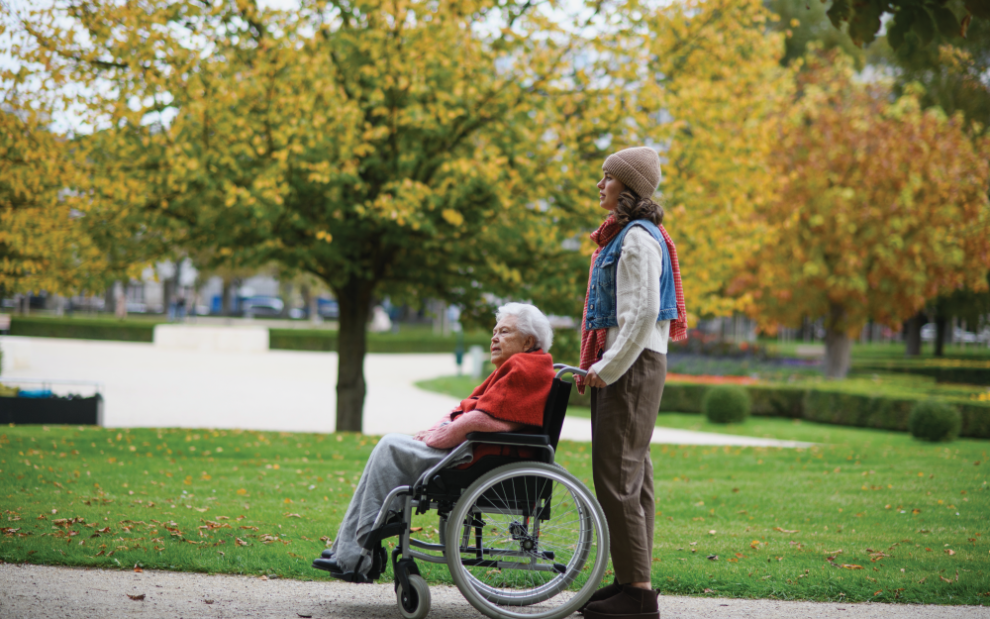During the final weeks of Kamala Harris’ unsuccessful run for the presidency, an attendee at a campaign event shared the struggle of balancing costly child care with dementia care for her mother. Harris acknowledged the U.S. caregiving crisis: the plight of caregivers in the “sandwich generation,” those caring simultaneously for children and aging parents, recalling her own experience caring for her mother before she succumbed to colon cancer in 2009.
Harris said that as president she would expand Medicare to cover “the cost of in-home health care for your parent.” This would provide the help this audience member needed, preserve her sanity, and allow her to “give that baby of yours all the love that they deserve.” The vice president assured the audience that “everyone can have dignity.”
It’s not clear if President Trump has in mind any similar changes to Medicare benefits, though his campaign has suggested help in the form of “tax credits and reduced red tape.” The truth is, the struggle and stress among the nation’s caregiving class is likely to only grow much worse before it gets any better. That’s unfortunate, because the problem is already at a crisis point.
More than 1 in 5 Americans already act as caregivers, attending to an adult or child with special needs at some time during the past 12 months. That’s an estimated 53 million people. As the nation grows older, those numbers will only increase, and if the incoming administration follows through on threats to deport undocumented migrants and reduce immigration, the structural pressures on the caregiving industry will only grow worse.
Caring for a disabled or elderly family member (often both categories apply) can place working adults in impossible binds. Unable to afford home-care services, many people are driven out of the workforce during their most productive years, creating a foundation for long-term poverty that will reverberate into the next generation.
Support for families in the United States is infamously parsimonious. Family leave to care for a family member who needs long-term care may be protected by law, but paying for it isn’t. Most working family members cannot take advantage of leave policies if they are unaccompanied by income support.
So-called informal caregivers, family and friends who assist elderly or disabled people, are helping to relieve a public burden without compensation. Often, these caregivers are sacrificing more than their time and emotional reserves. For many, most often women, the effort can mean forgoing opportunities in career paths and income. For college-aged young people, who represent 1 in 10 of all caregivers, this may mean giving up educational and career opportunities.
Looked at in economically clinical terms, those personal sacrifices affect the broader society. Left bereft of the full contribution caregivers could make in their working years, by one estimate this costs the U.S. GDP almost $300 billion each year.
Is the United States capable of lending practical assistance to families struggling with caregiving while treating care workers with dignity and fairness? Of course it is. What is lacking is the will to reallocate social resources appropriate to the need and the long-term common good.
Other advanced economies have already managed this balancing act. Two-thirds of member states in the Organization for Economic Cooperation and Development provide compensation to family caregivers, whether directly to those caregivers or indirectly through money to the people who are being cared for.
America’s Calvinistic tendencies shame most of us into treating caregiving as an individual, not collective, obligation. We see the inability to successfully juggle the gamut of responsibilities required of caregiving as a personal failure. That cruel fantasy of self-reliance comes at great cost to all of us, beginning with the people receiving our often distracted and disjointed care.
This article also appears in the February 2025 issue of U.S. Catholic (Vol. 90, No. 2, page 42). Click here to subscribe to the magazine.
Image: Shutterstock
















Add comment